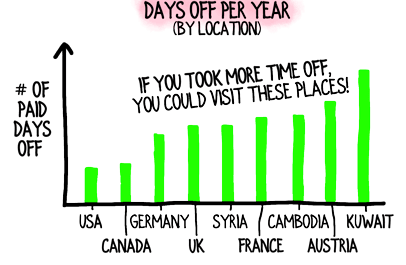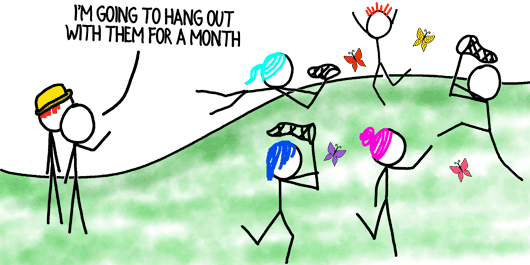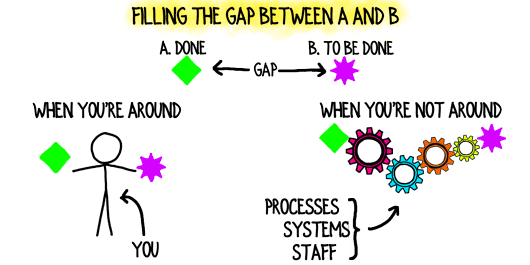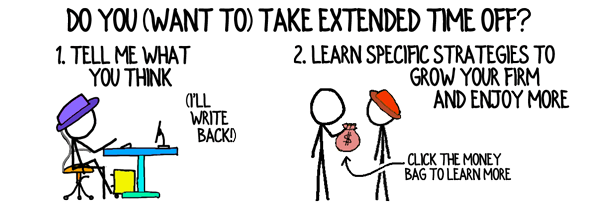Should you take more time off from your consulting firm? Let’s examine a case study.

Quite a few years ago, I decided to take a month off from my consulting practice—standard fare for Europeans but basically unheard of in the U.S.
Nine months later I took another full month off from the business. No client meetings, no emails, no calls, no checking in, no nothing.
Two full months off in the same year. As you would expect, the impact on my consulting firm’s revenue was noticeable.
It went up.
Way up.
That’s weird.
You, as a smart, consulting firm leader, could understandably assume that my experience was abnormal. Except…
The same thing has happened at many of our clients too. When they—the leaders of their respective consulting firms—have taken extended time away from their practice, their business grows.
Two theories on why this happens:
The ‘Good Energy’ Theory
Stripping off your work duds and donning your dancing togs (literally or metaphorically) feeds your heart. You immerse yourself in fun, self-care, growth and positivity.
Yes, I understand you truly enjoy your consulting work. Nevertheless, the positive emotions you experience when you’re away from the business are different.
Your internal fires burn brighter when you fuel your personal passions, whether those are fed by traveling, truffle hunting, building houses for the homeless, lepidoptery, or some other pursuit.

You also become a more interesting, energetic, admirable, inspiring person—the type of person whose consulting firm clients like to work with.
Don’t underestimate the magnetic draw of the well-rested, invigorated, jazzed up version of you.
The ‘Good Systems’ Theory
When I came back from vacation, my business was thriving.
My plants died, though. They were sad, wilted remnants of their former verdant selves.
Turns out I did a much better job of upgrading my business infrastructure than my horticultural support. (Also, the team at my firm ROCKS, whereas my plant whisperer wasn’t very reliable.)
When you plan for an extended vacation you tighten your processes, install missing supports and abandon the seat-of-the-pants, “figure it out on the fly” approach to running your consulting firm.

You may also re-envision your consulting firm’s revenue streams and delivery approaches.
For instance, a thought exercise about how I could take 3-4 months off each year while continuing to delight clients led to an improvement in our delivery model that has noticeably helped clients.
Finally, when you step aside, your staff can step up.
They will step up.
That’s great for them, for you, for your consulting firm and for your clients. (And if you have, literally, no staff, then you’re under-infrastructured. Even a solo consulting practice should be supported by an assistant.)
Walking away forces your consulting firm to be better, faster and stronger.*
What has your experience been in taking extended time off from your business? Is it something you’d like to try or, perhaps, something you’ve done already? Tell me more!
Text and images are © 2024 David A. Fields, all rights reserved.

 David A. Fields Consulting Group
David A. Fields Consulting Group 

Great piece! Also, a half sabbatical made me redefine the whole consulting practice, creating a much more customer focused offer.
Also, the team was able to mature faster.
Congratulations on the time off, Hugo, and thank you for providing the outstanding example. (Plus, making me aware of the “half sabbatical”.)
A mature team and a better offer can transform your firm. Those are much harder to achieve when you’re managing the day-to-day fires of running a business. Well done!
Hey Hugo,
I was curious: how long did you take off for your half sabbatical? I’m planning to take more time off in 2023 and curious what you did.
I find the same to be true in my consulting practice. Whenever I’ve taken off or worked remotely for extended periods of time it somehow leads to closing bigger deals. I still get nervous before these longer trips but time and time again it has led to great business results. I encourage everyone to give it a try!
Good on you for recognizing the fear and taking the time off anyway, Dan.
Thank you for sharing your results. It’s one thing when I say it, but when readers can see it works for others, that carries more weight. You’re an outstanding example, Dan.
Very timely, as we just returned from two weeks in Italy and are already talking about going back for a full month next year. The Italian culture compels you to slow down, be in the moment and relax, all of which lay a wonderful foundation for creativity and inspiration – critical for determining how I want my firm to grow and planning how to get there. As an independent PR consultant and advisor, finding time to work ON my business instead of IN it is always a challenge. MAKING time has become a top priority in recent months as my business continues to grow. Now that you’ve advised such, of course I have to do it!
Eccelente, singora! Welcome back from the trip and definitely go back for a month. We found that in a month we barely scratched the surface of Italy and we missed many regions. A month in Sicily is on our list too.
Your experience–that the time off has forced you to think differently about your business– is exactly on point. Kudos to you for creating a thriving business that also supports you as a person. You’re making it happen, and it’s a terrific example to us all, Wendy.
I’ve also seen the antipattern to this come to a head – individuals key to standing in for good processes eventually burn out and leave the firm. This makes the firm scramble to fill that gap – usually with the next person in line, or even try to dream up an awkward ‘subcontract’ arrangement.
As with any system, a backup should be in place and the backup needs to be tested! What better way to test a backup than to have some fun!
That’s a terrific corollary, Josh. Testing your backup systems is important, and a hypothetical test is inadequate. Therefore, step out of your business to stress test your systems. (And, of course, counterbalance the stress test by doing something decidedly non-stressful yourself!)
Great contribution to the discussion, Josh. Thanks for chiming in!
Wow! That is not the direction I was expecting the article to take. I had assumed the message would be to slow down on delivery and utilization to build systems, support, etc. This makes a ton of sense (reminded me of Kennedy’s rested appearance when debating Nixon) and am inspired to give it a try! It’s also a great incentive for me to get my systems, support, etc. in place ASAP!
Boom, inspiration and a historical political reference in one go. That’s a winner, Toopan! Yes, the extended time off can be the “why” that forces you to improve your systems, processes, structure and team. Don’t forget that the right team is a big piece of the puzzle.
I’m glad you added your voice to this discussion, Toopan.